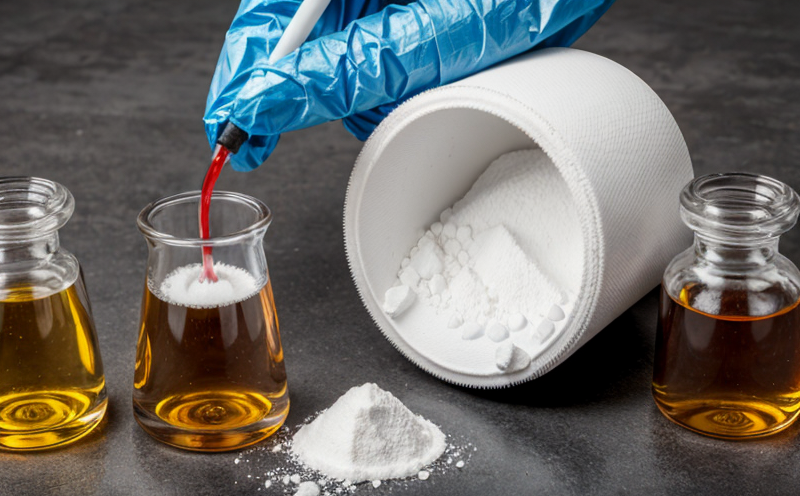Materials & Chemical Compliance Testing
Materials and chemical compliance testing is a critical aspect of ensuring that products meet regulatory standards, environmental requirements, and safety expectations. This service involves evaluating the composition, properties, and behavior of materials used in various electronic components and devices to ensure they comply with international standards like ISO, ASTM, and EN.
The process begins with identifying the specific compliance requirements for the material or chemical under consideration. For instance, if a new type of plastic casing is being developed for an electronic device, it would be necessary to test its flammability according to UL 94, its thermal stability based on ISO 11357, and its durability in terms of resistance to environmental factors such as humidity or temperature changes.
Once the compliance requirements are established, testing can proceed. This typically involves several stages: initial sample preparation, which might include cutting samples into standard sizes; conducting preliminary tests to determine baseline properties; followed by more rigorous tests designed specifically for evaluating compliance with relevant standards. The results of these tests are then compared against specified limits or acceptable ranges.
Testing methodologies vary widely depending on the material being tested and its intended use within an electronic product. For metals, this could involve checking for impurities using inductively coupled plasma mass spectrometry (ICP-MS) or X-ray fluorescence (XRF); for polymers, it might require mechanical testing such as tensile strength measurements or impact tests; while for electronics-grade chemicals, purity checks may be conducted via gas chromatography-mass spectrometry (GC-MS).
Compliance testing is not just about meeting regulatory requirements but also ensuring the long-term reliability and performance of electronic components. By identifying potential issues early in development through thorough testing procedures, manufacturers can avoid costly recalls later on due to non-compliant materials.
- Flame Retardancy: Ensuring that materials do not ignite easily or burn rapidly when exposed to fire hazards is crucial for safety and compliance with regulations like UL 94.
- Mechanical Properties: Evaluating how well a material withstands physical stresses such as bending, stretching, compression, and impact helps ensure durability under operational conditions.
- Electrical Conductivity: Testing the electrical properties of materials used in printed circuit boards or other conductive assemblies is essential for proper function and safety.
- Environmental Stability: Assessing a material’s resistance to environmental factors like humidity, temperature fluctuations, and exposure to chemicals ensures longevity in diverse operating environments.
In summary, materials and chemical compliance testing plays an indispensable role in safeguarding both human health and the environment by guaranteeing that electronic products meet stringent quality standards. It enables manufacturers to produce reliable, safe devices while minimizing risks associated with non-compliant components.
Why It Matters
Compliance testing for materials is paramount because it directly impacts consumer safety and environmental protection. Non-compliant materials can lead to hazardous situations such as fires or toxic emissions during production, use, disposal, or recycling processes. For example, certain plastics used in electronic devices might release harmful volatile organic compounds (VOCs) into the atmosphere if they do not meet specific emission limits.
Moreover, ensuring that all chemicals and materials are safe for human contact is essential when considering their potential applications in consumer electronics. This includes assessing biocompatibility of materials intended for direct skin or body interaction, such as those found in wearable technology or medical devices connected to electronic systems.
The importance of compliance testing extends beyond mere legal requirements; it also fosters innovation by encouraging developers to explore safer alternatives and improve existing formulations. By adhering strictly to established standards throughout the design phase, companies can anticipate challenges before they become significant issues, leading to better product development cycles overall.
From a business perspective, compliance ensures favorable market access for products across different regions, thereby enhancing brand reputation and customer trust. It also helps avoid costly penalties resulting from non-compliance incidents or recalls after the fact.
Eurolab Advantages
At Eurolab, we pride ourselves on offering comprehensive materials and chemical compliance testing services that cater to our clients' diverse needs. Our team of experts leverages cutting-edge analytical techniques and state-of-the-art facilities to deliver accurate results tailored specifically for your projects.
- Comprehensive Testing Capabilities: We provide a wide range of tests covering various aspects of material properties, including physical, chemical, and mechanical characteristics. Our services encompass not only standard compliance checks but also customized testing protocols designed uniquely for niche applications or emerging technologies.
- Accurate Results: Utilizing advanced instrumentation such as scanning electron microscopy (SEM), Fourier transform infrared spectroscopy (FTIR), and differential scanning calorimetry (DSC), we ensure precise measurements and reliable data.
- Fast Turnaround Times: By streamlining our workflows and utilizing efficient resource allocation strategies, we strive to provide quick turnaround times without compromising on quality. This allows you to receive your test reports promptly so that you can make informed decisions about product development or regulatory compliance.
- Expert Consultation: Our experienced scientists are available to provide guidance throughout the testing process, offering valuable insights into interpreting results and addressing any concerns you may have regarding material selection or chemical formulation.
We understand that every project has unique requirements. Therefore, we offer flexible pricing models and tailored solutions to meet your specific needs whether you're a small startup or an established corporation.





